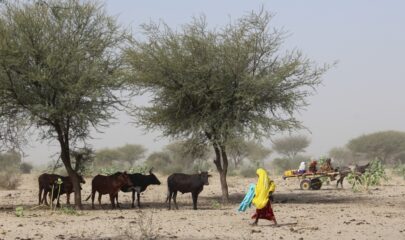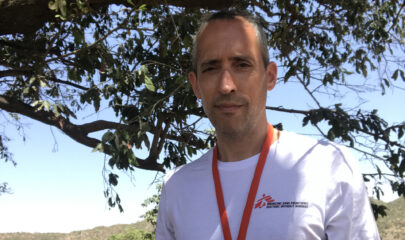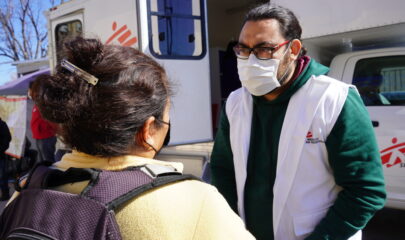
Yemen, 2021. © Nasir Ghafoor/MSF
Nogood Mohammad Ahmed Sham-san lies under the covers of her bed, exhausted. Next to Shamsan is her mother sitting in a chair, making sure her daughter is comfortable. Both Shamsan and her mother have their heads turned to the side looking towards Shamsan’s right hand, under which one-day-old Ahmed is sleeping, grabbing onto the nest of blankets that surround him.
Shamsan was admitted to the post-op-erative ward after delivering Ahmed through caesarean section at the mater-nity unit in the Al-Jamhouri hospital, in Taiz city, Yemen. Doctors Without Bor-ders/Médecins Sans Frontières (MSF) and the Ministry of Health have been running the maternal and neonatal services in
the hospital together since May 2021. MSF provides technical support, financial incentives to the Ministry of Health staff, and medical and logistical supplies to run the maternity unit including services such as caesarean sections, pre- and postnatal care, family planning, vaccina-tion and neonatal care.
More than eight years of war in Yemen is taking a devastating toll on people in many ways, including the ability to reach quality and timely healthcare.
According to the World Bank, fewer than 50 per cent of healthcare structures in Ye-men are functioning. Most primary health-care centres are only partially functioning due to lack of equipment, medical sup-plies, or medical staff. This situation drives people to seek available and free healthcare in the closest possible area – a task that is not always easy.
“I come from Bani Oman, a village,” says Shamsan. “My financial situation is not that good, so I came to Al-Jamhouri hospital to have my caesarean section because it is free. There is only one health centre in the village, but it is not good. It is not qual-ified because of the equipment that is not available there.”
“I came to Al-Jamhouri
hospital to have my caesarean
section because it is free.”
“It took me two hours to come here,” says Bushra Khaleed Abdualrahman*, who is eight months pregnant. Abdualrahman’s brother brought her to the hospital for emergency medical care from Sabr Al Shaqeb area.
“The roads are destroyed, and our route is mountainous,” she says. “After the rain the road becomes worse and worse. I was in pain and due to the arduous journey, I became so unwell.”
After many years of fighting, Taiz is still divided in two: Taiz city, and the suburb of Al-Houban. The frontline that runs through it is littered with landmines and guarded by snipers. To reach Taiz city, people must take the long, perilous journey through the mountains to avoid crossing the frontlines. Prior to the conflict, it took 10 minutes to reach Taiz city from Al-Houban. Now it takes between five and eight hours.
Pregnant women living in rural areas come to the hospital with high risk or compli-cated pregnancies that could have been avoided, stemming from a lack of consis-tent pre- and postnatal care and moni-toring. This can be either due to absence of the services or the necessary medical specialties and basic equipment, like ultra-sound machines.
“The first time that I had pain I went to a doctor in my area and they just gave me first aid,” says Abdualrahman. “There is no equipment or machines and that’s the only thing they were able to do.”
According to Mduduzi Chandawila, MSF’s medical team leader in Taiz city, most of the women that come to Al-Jamhouri hospital from remote locations have rarely attended prenatal consultations.
“It’s a challenge,” says Chandawila. “Some of the high-risk pregnancies that come to prenatal care here in Al-Jamhouri hospital are coming for the first time. Some of them are already in their eighth or ninth month of pregnancy.”
LACK OF COMMUNITY HEALTH PROMOTION
The nearly collapsed health system, com-pounded by obstacles to access – insecu-rity, availability and affordability of health services – and the lack of community health promotion of habits such as prenatal and postnatal care, gravely impact pregnancies. Women and babies’ lives are put at risk.
MSF provides health promotion in the waiting areas of the maternity ward and in the community to spread awareness about the importance of pre- and postnatal care.
“Through prenatal care, health conditions can be identified early in terms of the way to deliver or mode of delivery, what sup-port they need, and what medication or treatment they need before they deliver,” says Chandawila. Postnatal care is also very important so staff can monitor patients after surgery for infections and other com-plications that may develop.
After MSF began supporting the maternity unit, there was a sharp reduction in neona-tal mortality and increase in pre- and post-natal consultations. Between August 2021 and August 2022, the neonatal mortality rate reduced from approximately 24 per cent to 10 per cent. Pre- and postnatal con-sultations also increased, from 1,364 pre- and 86 postnatal consultations, to 1,795 pre- and 527 postnatal consultations.
While these numbers are encouraging, gaps remain. Timely access to primary healthcare is vital but remains a challenge, especially for pregnant women who should be regularly monitored from the beginning of their pregnancies to avoid potentially life-threatening medical compli-cations for them and their babies.
*Name changed to protect privacy.

© Evgenia Chorou/MSF


